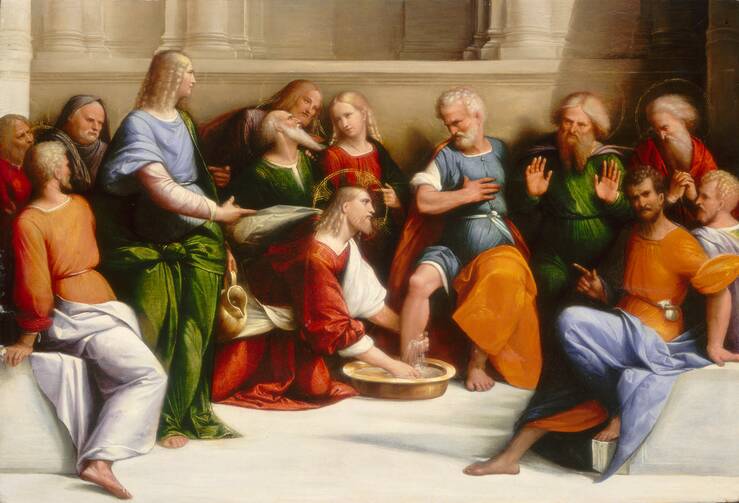A Reflection for Holy Thursday
Readings: Exodus 12:1-8, 11-15 1 Corinthians 11:23-26 John 13:1-15
In the April 4 edition of The New Yorker, its editor, David Remnick, reports that early in his presidency, Vladimir Putin, who identifies as an Orthodox Christian, was taken to church by a confident, a banker named Sergei Pugachev. It was Forgiveness Sunday, which the Orthodox celebrate just before Lent begins. More accustomed to church than the president, Mr. Pugachev
told Putin that he should prostrate himself before the priest, as an act of contrition. “Why should I?” Putin is said to have replied. “I am the President of the Russian Federation. Why should I ask for forgiveness?’
As modern people, we are masters of our worlds. Having filled the cosmos with ourselves, there seems to be no room, or need, for God. The only problem is those who share the world with us. How is it that we have mastered the world but not each other, not ourselves?
As modern people, we are masters of our worlds. Having filled the cosmos with ourselves, there seems to be no room, or need, for God.
President Putin is not alone, insisting upon “his way.”
“I’m right. You’re wrong. It’s as simple as that.”
“I give and give. You just take.”
“I’ve been pushed around enough. Try some of your own medicine.”
We may not have said such things, but most of us can admit to thinking them. For the sake of argument, let us agree that you are right, that you do all the giving and that you have been pushed around long enough. You may have mastered the world, but others can still make you miserable. Why is the world suffused with a sadness it cannot command?
Something is missing. We call it God.
Why is the world suffused with a sadness it cannot command? Something is missing. We call it God.
Our Christian faith never attempts to prove the existence of God. We would have to possess God, at least conceptually, to do that. No, our faith simply says that if we honestly look at life, we perceive an absence. We yearn for something we cannot even imagine, much less describe.
There is a vital, original source from which we have been cut off. It is also the hope of a horizon, a promise that we can keep living, growing and loving.
In Jesus’ resurrection from the dead, the first Christians experienced a union with God they had never known. What does this mean? Yearning gave way to delight. Absence to presence. Life’s horizon itself was suffused with hope.
We cannot gainsay or judge their experience. They are in the past, and for all our ingenuity, it remains sealed for us. Yet they insist that we need not simply trust their word, their Gospel, which they went to such effort to compose and proclaim. They tell us that, if we simply begin to live another way, we will see the truth, the satisfaction and the hope that they found. So often in the New Testament, they simply refer to themselves as ho zōntes (the living).
In St. John’s 13th chapter, Jesus tells his disciples, and us, “You are clean.” It is a metaphor employed in all religions. What keeps us from the strength of our origin and the fulfillment of all our hopes is some alienation, some absence that must be found.
On this night, and on the day to follow, Jesus reveals his deepest self. He washes the feet of his disciples. In St. John’s narrative of the supper, this action stands in for his gift of self that is the bread and wine.
We have always wanted to be God, to claim the right of truth, to receive and not to give. Yet on this night, Jesus pours it all away, our very understanding of God, over our feet and into a basin to be pitched.
Many of the early Church Fathers referred to the washing of the feet as a sacrament, but they did not mean one of the seven visible signs. No, they were thinking of the original meaning of the word sacramentum, a bottomless mystery. Put another way, we can spend the rest of our lives pondering this action of Christ and never stop learning from it.
Our Lord says that we are now clean. Why? Because our origin and our destiny has come looking for us and has found us. That which is infinite becomes our slave. A fullness that we cannot imagine bends down and washes our feet. Hope, which ever runs before us, out of reach, now pours itself over us.
But we are like Peter. We will yet save ourselves. God need only guarantee our right, be our power, take our side. What we really mean is: God need only to be ourselves, writ large.
“You will never wash my feet.”
But our Lord tells Peter, “Unless I wash you, you will have no inheritance with me” (Jn 13:8).
It is all such a mystery. Such an imponderable depth. “What I am doing, you do not understand now, but you will understand later” (Jn 13:7). We have always wanted to be God, to claim the right of truth, to receive and not to give, to push back with all our might.
Yet on this night, Jesus pours it all away, our very understanding of God, over our feet and into a basin to be pitched. The lion that is God becomes the lamb. What then will become of us? That is, indeed, the question.








